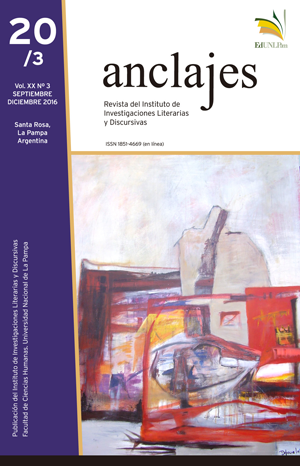Los congresos de la lengua española: configuración de una matriz discursiva
Palavras-chave:
lengua, discurso, política lingüística, identidad, ArgentinaResumo
Los Congresos Internacionales de la Lengua Española (CILE) constituyen uno de los dispositivos principales que ha desplegado la política lingüística panhispánica implementada por España en las últimas décadas. Estos acontecimientos públicos difunden un discurso homogéneo sobre el español y buscan generar un espacio de aceptación y promoción de instrumentos lingüísticos que se presentan como comunes en todo el ámbito hispánico. En este marco, consideramos que los CILE integran una determinada matriz ideológico-discursiva cuyos rasgos principales pueden identificarse en un congreso que operó como antecedente en 1892. Asimismo, ciertos componentes de la matriz se inscriben en una más amplia que circula en discursos variados desde fines del siglo XIX hasta la actualidad, aunque con algunas modificaciones vinculadas con cambios coyunturales. Estos discursos privilegian la conservación de la unidad lingüística en la comunidad hispánica y sitúan en la Península un liderazgo “natural” frente a los países americanos en materia de autoridad lingüística.
Downloads
Downloads
Publicado
Edição
Seção
Licença

Este trabalho está licenciado sob uma licença Creative Commons Attribution-NonCommercial-ShareAlike 4.0 International License.
Os autores devem aderir à licença Creative Commons 4.0 denominada “Atribución - No Comercial -CompartirIgual CC BY-NC-SA”, por meio da qual é permitido copiar, reproduzir, distribuir, comunicar publicamente o trabalho e gerar trabalhos derivados, desde e quando o autor original é citado e reconhecido. No entanto, você não tem permissão para usar o trabalho ou seus possíveis trabalhos derivados para fins comerciais. os/as autores/as devem aderir à licença Creative Commons 4.0 denominada "Atribuição - Não Comercial-CompartilhaIgual" (CC BY-NC-SA 4.0), que permite a cópia, reprodução, distribuição, comunicação pública da obra e criação de obras derivadas, desde que a autoria original seja citada e reconhecida. No entanto, não é permitido utilizar a obra nem suas possíveis obras derivadas para fins comerciais. Além disso, os/as autores/as cedem à Anclajes os direitos para a publicação de seus textos, mantendo, no entanto, sua propriedade intelectual. Isso significa que a publicação não retém os direitos de reprodução ou cópia (direitos autorais), permitindo que as pessoas responsáveis pela autoria possam disponibilizar as versões finais e divulgá-las em repositórios institucionais, temáticos, páginas pessoais na web ou qualquer outro uso relevante, desde que a fonte original de publicação seja mencionada.








.png)

2.png)















_(2).png)






.jpg)
_(1)1.jpg)



.jpg)



